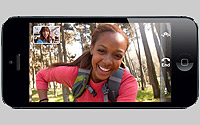Consumer Groups Ready FCC Complaint Against AT&T
- by Wendy Davis @wendyndavis, September 18, 2012

AT&T's plans to limit the availability of the FaceTime video chat app will harm "individuals and innovators alike," a coalition of consumer groups argue in a letter to the telecom.
Free Press, Public Knowledge and The New America Foundation's Open Technology Institute are asking AT&T to back away from its plan to prevent consumers who subscribe to older, individual data plans from accessing FaceTime over the 3G or LTE network.
The telecom says all subscribers will be able to access FaceTime on WiFi, but only those on the new shared data plans will be able to run FaceTime on one of the data networks -- which often are more widely available than WiFi.
The consumer groups argue that AT&T's restrictions on FaceTime violate the Federal Communications Commission's open Internet rules, which prohibit wireless providers from blocking the use of competing apps.
"As long as you're buying a data plan from AT&T, you should be able to use that data however you choose," says Joel Kelsey, legislative director at Free Press. He says the groups plan to file a complaint with the FCC if AT&T does not revise its plan. (FCC regulations require groups to give broadband providers at least 10 days notice before filing a formal complaint about neutrality violations.)
AT&T's move is seen as hindering consumers on older, individual plans who want to use FaceTime for voice calls. That group typically pays for calls by purchasing a block of minutes (such as $40 a month for 450 minutes), and also pays charges for the broadband data they consume (such as $30 a month for 3 GB of data). Telephone calls made through apps aren't counted against subscribers' minutes, so some consumers could save money by staying with an older plan and using FaceTime to make phone calls.
While the groups argue that AT&T's restrictions violate the neutrality regulations, it's not yet clear that those rules will survive in court. Verizon and MetroPCS recently asked a federal appeals court to vacate the rules on the grounds that the FCC lacks authority to regulate broadband.
For now, the watchdogs are urging AT&T to "reconsider its behavior and the impact that blocking FaceTime will have on its customers, particularly the deaf and hard of hearing, as well as all who use this application to communicate with family and friends over the Internet."
AT&T was recently criticized for imposing a FaceTime "deaf tax" in an op-ed by Brendan Gramer that appeared in Wired. He says that as a deaf person, he expected to be able to use FaceTime "to communicate with friends and family in my natural language: American Sign Language."
He added: "But then I found out that AT&T will block mobile FaceTime unless customers sign up for an expensive unlimited voice plan. I wasn’t thrilled with the thought of having to pay this AT&T 'deaf tax' just to use the mobile data I’m already paying for."
AT&T did not respond to Online Media Daily's request for comment about the letter from consumer groups at press time.


